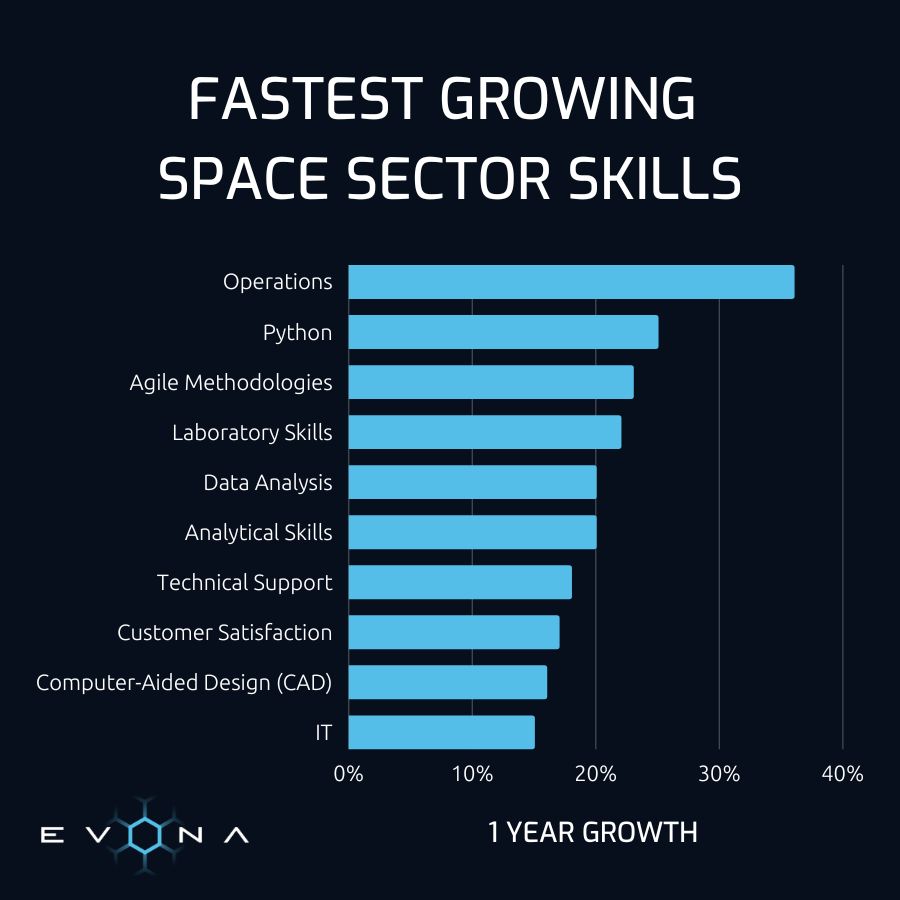Up and Up: the Space Industry's Fastest Growing Skills
The space industry is rapidly expanding, creating demand for a highly skilled workforce to drive innovation and push boundaries.
At this pivotal moment in the sector’s evolution, the need for skilled professionals is higher than ever before. From engineers and scientists to operations managers and marketers, there’s a wide range of careers in space open to anyone with a dream.
To stay ahead of the curve in this dynamic field, it’s crucial to keep up with the latest trends and developments. Understanding the fastest-growing skills in the industry is an essential part of this.
To give you a head start, we’ve used our data to map the top growing skills in the space sector:

The three fastest growing space sector skills are:
-
Operations
-
Python
-
Agile Methodologies
Non-Technical Skills
Across the space industry, we’re seeing an increase in demand for non-technical skills, such as operations and customer satisfaction. While we often associate space exploration with scientists and engineers, the sector also depends heavily on people with skills in operations, finance, marketing, and many other areas. From managing complex logistics to securing funding and building public support, every role is critical to the success of space missions.
While scientific and technical knowledge is certainly valuable, it’s not the only thing that counts in the space sector. This industry welcomes individuals from a wide range of backgrounds and skill sets, including artists, writers, lawyers, and even chefs. If you have a love for space and a willingness to learn, there is a place for you in the space industry.
Operations
Operations was the fastest growing skill in the space sector by a significant 10%.
Operations professionals play a critical role in the space industry, overseeing numerous complex functions that are essential for the success and day-to-day running of space companies. They are responsible for managing processes, IT, accounting, human resources, purchasing, and inventory, to name a few.
These professionals must develop and implement effective procedures to ensure that all operations are conducted safely, efficiently, and in compliance with regulations and standards. They must also manage budgets, track expenses, ensure the right people are hired and trained, manage inventory levels, and oversee all IT-related functions. Without the expertise of operations professionals, space companies would struggle to operate safely, efficiently, and effectively, and would be unable to achieve their ambitious goals and objectives.
Top Job Titles & Average Salaries
-
Operations Manager – $112,022
-
Program Manager -$144,635
-
Project Manager – $105,231
-
Director of Operations – $140,908
-
General Manager – $143,689
Competing Industries
-
IT Services
-
Higher Education
-
Management Consulting
-
Non-Profit Organization Management
-
Government Administration
Python
Unsurprisingly, Python ranked second with a one-year increase of 25%. Python has become one of the most popular programming languages for a wide range of applications due to its simplicity, readability, and versatility. It has a large community of developers and users who constantly contribute to its development and improvement. As a result, Python has a rich set of libraries, frameworks, and tools that make it easier to work with various fields.
As of 2023, demand for Python developers has increased 41%. This high-position programming language can open an enormous range of career paths, including opportunities in web development, data science, machine learning, artificial intelligence, automation, and more. The versatility of Python means that it can be applied to almost any field or domain, making it a valuable tool for developers and businesses alike.
Top Job Titles & Average Salaries
-
Software Engineer- $98,300
-
System Engineer – $99,770
-
Electrical Engineer – $92,100
-
Mechanical Engineer – $98,044
-
Data Scientist – $101,756
Competing Industries
-
IT Services
-
Computer Software
-
Higher Education
-
Banking
-
Management Consulting
Agile Methodologies
Next up was agile methodologies, with a one-year increase of 23%. Agile methodologies are a progressive approach to software development that prioritize adaptability, collaboration, and responsiveness to evolving requirements. Unlike traditional development models that follow a rigid and sequential process, agile methodologies enable teams to work collaboratively, continuously delivering working software and responding quickly to feedback.
As the demand for digital transformation continues to rise, organizations across industries are seeking agile practitioners who can help them stay competitive in the market. Pursuing a career in this field offers exciting opportunities to work with cutting-edge technologies, collaborate with diverse teams, and tackle complex challenges with innovative solutions. Agile practitioners are not only in high demand but also have the opportunity to make a significant impact on the success of organizations, driving growth, and innovation through their work.
Top Job Titles & Average Salaries
-
Software Engineer – $98,300
-
System Engineer – $99,770
-
Program Manager – £122,400
-
Scrum Master – $104,201
-
Software Architect – $142,577
Competing Industries
-
IT Services
-
Computer Software
-
Banking
-
Management Consulting
-
Telecommunications
Whether you are just getting started in your career or are a seasoned professional, there has never been a more exciting time to be involved in space exploration.
The space industry presents an exciting and ever-changing landscape for professionals who are passionate about exploration and discovery. Staying informed about the latest developments in the space industry can help you identify emerging areas of interest and stay ahead of the curve in this rapidly changing field.


